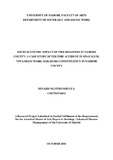| dc.description.abstract | The study sought to examine the social and economic impact of fire disaster to residents of Sinai slum who were affected by 2011 inferno. The study will add knowledge on understanding how various risk factors contribute to the occurrence of fire disaster in Kenya. The study was conducted in Sinai slum Makadara constituency within Nairobi County.
The aim of the study was to establish the socio-economic situation of Sinai residents before the fire disaster, to identify the effects of Sinai fire on household cohesion, to find out the risk perceptions among Sinai residents following the fire accident, to examine the risk reduction strategies created following Sinai inferno, and to establish the effect of Sinai fire disaster on household incomes and poverty levels.
The study utilized purposive sampling where 320 respondents were selected. The quantitative data was collected from main respondents constituted both male and female residents of Sinai slum and analyzed by using a statistical package for social sciences (SPSS) while qualitative data was collected from key informants and analyzed using content analysis.
The results of the study revealed that poverty, housing, illegal electricity connections and lack of access roads were causes of fire disaster within Sinai slum. The study showed that impacts of the inferno on residents led to break up of families, divorce, orphan hood, and widowhood.
The study recommends that both County and National government should come up with a relocation programme in this area. They should be settled on permanent houses to alleviate another disaster since most resident are on top of pipeline and under high voltage electric cables. The study also found out that there is need to train people on effective response to fire disaster in term of preparedness, evacuation, mitigation, so that there could minimize loss of life and damage. Both national and county government should lender victims of Sinai fire some soft loans to start small business enterprises to uplift their living standards and also to have a source of living. In addition, there should be nationwide public awareness campaign on effects of siphoning oil and measures to be put in place to control fire. | en_US |



